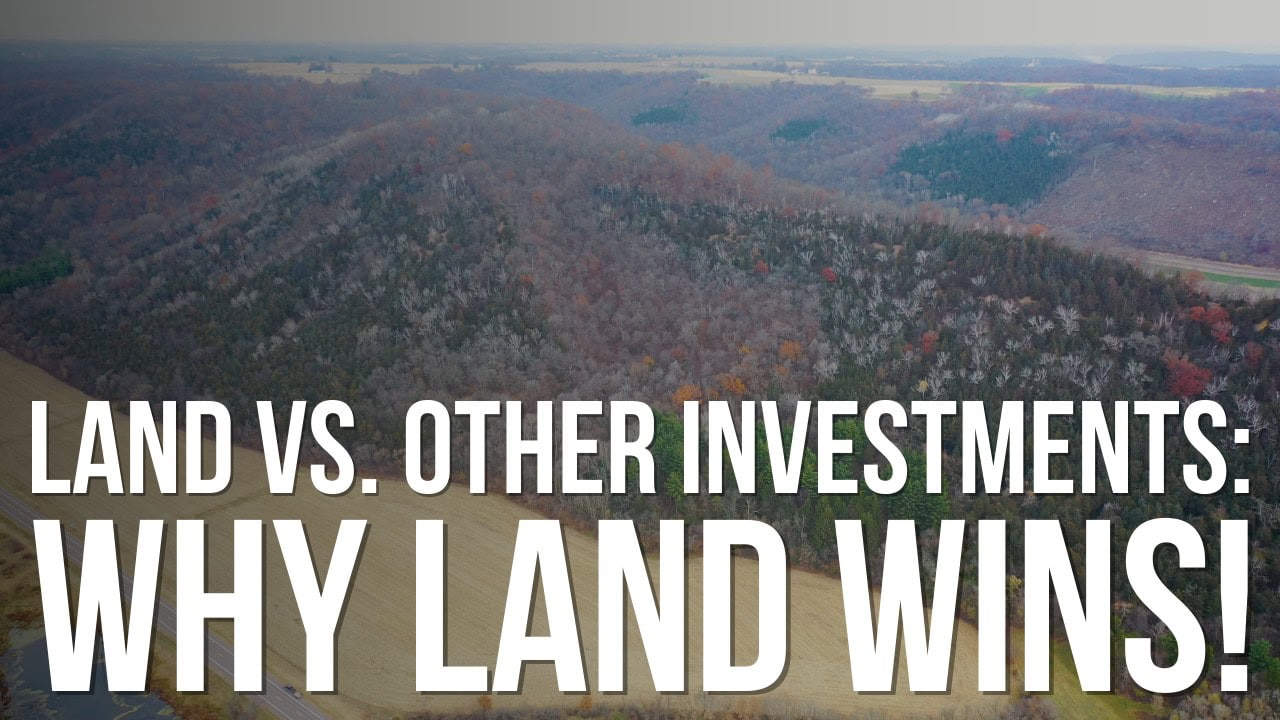Land ownership runs deep in American culture. It represents something real and tangible that you can walk on, build on, or simply hold for the future. With the housing deficit exceeding 4 million homes and rising material costs driving construction challenges, more people are looking at raw land as a smart alternative to traditional real estate investments.
The land market in 2025 offers special opportunities that go beyond typical investment options. Interest rates are starting to decline, encouraging buyers who have been waiting on the sidelines for the past few years. Raw land for sale provides a different path forward for people who want to own something substantial without dealing with tenants, repairs, or property management headaches.
1. Land Is a Finite and Valuable Resource
There is a simple reality about land that makes it fundamentally different from other investments. They stopped making it. Unlike other assets that can be heavily impacted by economic downturns, land tends to appreciate over time. Every year, urban areas expand outward, farmland gets developed, and the remaining undeveloped parcels become more valuable. This basic supply and demand equation has driven land values steadily upward for generations. Population growth continues pushing demand higher while the total amount of available land remains constant. Physical ownership of land provides something that digital investments and paper assets can never.
2. Land Offers Personal and Lifestyle Freedom
Owning your own piece of land means you control what happens on it. You make the rules, set the boundaries, and decide how to use every acre. This freedom attracts people for many different reasons.
- Build your dream home when you are ready, not when a developer tells you to.
- Create a weekend retreat away from city noise and neighbors.
- Start that small farm or orchard you have been thinking about.
- Set up a hunting camp or recreational property for family gatherings.
- Hold it as an investment while you decide on future plans.
- Lease portions for farming, grazing, or other income opportunities.
No homeowners’ association telling you what color to paint your fence. No landlord raising your rent. Just you and your land, with complete control over how you use it.
3. It Is a Low-Maintenance Asset
Land ownership requires minimal ongoing effort compared to rental properties or developed real estate. You do not have to deal with tenants, lawn care, leaking roofs, bursting pipes, or anything else that does not directly benefit what you will be using the land for. Raw land sits there, slowly appreciating in value while you go about your life. Property taxes are typically lower on undeveloped land than on improved properties. You avoid the constant maintenance costs that eat into rental property profits. No emergency calls about broken water heaters or damaged siding.
4. It Is Often More Affordable Than You Think
Raw land typically costs far less per acre than developed properties in the same area. Land typically costs less than homes or commercial properties, especially in rural or undeveloped areas. You can often buy several acres of land for the same price as a small city lot with a house on it. Rural areas offer particularly good value, with productive farmland or recreational property available at prices that make sense for regular investors. Entry costs stay reasonable because you are not paying for buildings, utilities, or other improvements. Many parcels qualify for owner financing or land-specific loan programs, making purchases accessible without massive down payments.
5. Strong Long-Term Investment Potential
Historical data show land values climbing steadily over decades, particularly in areas experiencing population growth or development pressure. Farmland values have risen globally with a 10% annual average growth rate since 2000, outperforming many traditional investment categories. Land near expanding cities or growing towns tends to appreciate faster than the general market.
Strategic land purchases benefit from multiple value drivers working simultaneously. Population growth creates demand for housing and commercial development. Infrastructure improvements like new roads or utilities increase property values. Land near major projects, such as new highways or transit hubs, can experience significant appreciation as these projects are completed. Agricultural land benefits from rising food prices and increasing global demand for productive acreage. Recreational land for sale gains value as outdoor activities become more popular and accessible public land becomes more crowded.
6. You Can Earn Passive Income From Land
Land generates income without requiring daily management or constant attention. Smart landowners find multiple revenue streams from the same property.
- Lease farmland to local farmers for crop production or grazing rights.
- Rent hunting rights during deer, turkey, or waterfowl seasons.
- Allow timber harvesting on wooded acreage for periodic income.
- Install solar panels or wind turbines through energy lease agreements.
- Permit billboard placement along highway frontage.
- Rent space for equipment storage, RV parking, or seasonal uses.
- Harvest and sell specialty crops like hay, pecans, or pine straw.
These income opportunities often stack together, with the same land producing agricultural income, hunting lease revenue, and timber profits over time. Landowners can grant their land as per the location and the demand for agricultural, residential, commercial, or recreational purposes.
7. It Is a Safe Hedge Against Market Uncertainty
Land provides stability when financial markets swing wildly. Farmland’s performance is often influenced by factors such as crop yields, land values, and agricultural trends, making it less sensitive to broader market swings. Stock market crashes do not directly impact the value of your acreage. Currency fluctuations matter less when you own physical assets. During inflationary periods, land values and rental rates typically rise along with general prices. This makes land an effective portfolio diversifier, reducing overall investment risk while maintaining growth potential. Many wealthy families have preserved wealth across generations through strategic land holdings, passing valuable property to children and grandchildren as a foundation for financial security.
8. Land Can Be Easier to Buy Than You Expect
The process of buying land involves fewer complications than purchasing developed properties. No home inspections revealed expensive problems. Fewer contingencies and negotiation points to work through. In September, the Federal Reserve cut the federal funds rate by half a percentage point, making financing more accessible for land buyers.
- Rural land transactions often close quickly with minimal paperwork.
- Owner financing remains common, particularly for larger parcels.
- Land-specific loan programs offer competitive rates and terms.
- Title issues occur less frequently on undeveloped property.
- Environmental assessments are simpler without existing structures.
Many land companies specialize in making transactions straightforward and transparent. They provide soil maps, aerial photography, and property reports upfront. Professional guidance helps buyers understand zoning, access rights, and development potential before making offers.
Real Misconceptions Versus Reality
People often hesitate to buy land based on outdated ideas or misunderstandings about the market. The reality looks quite different from common assumptions. Some believe land takes forever to sell, but properly priced and marketed properties move quickly in strong markets. Properties available for purchase remain limited in many markets.
This scarcity has led to a quick turnaround time for many sellers. Others think financing is impossible to obtain, yet numerous lenders specialize in land loans with reasonable terms. The idea that only wealthy investors can afford land ignores the many affordable parcels available, particularly in rural counties where farms for sale offer excellent value. Smart buyers recognize that these misconceptions create opportunities for those willing to look past surface assumptions.
Key Things to Consider Before You Buy
Smart land purchases require understanding several important factors that affect value and usability.
- Verify zoning regulations and permitted uses for your intended purposes.
- Confirm legal access to the property via deeded easements or road frontage.
- Check utility availability or costs to bring power, water, and septic to the site.
- Review survey boundaries and resolve any encroachment issues.
- Understand property tax rates and potential agricultural exemptions.
- Research mineral rights and whether they convey with the land.
- Investigate deed restrictions or conservation easements affecting use.
- Evaluate soil quality for agriculture or septic system installation.
Due diligence prevents expensive surprises after closing. Professional assistance from land specialists helps identify potential issues early. Taking time to thoroughly evaluate the property ensures your investment meets both current needs and plans.
Why Buyers Trust High Point Land Company
For more than 40 years, High Point Land Company has been the trusted source for land sales in the Midwest. We work with every type of property, from small hunting tracts to large working farms. Our team understands soil types, crop yields, and the details that make a property a worthwhile investment. We can tell you if 80 acres will generate a cash flow, or if the hunting on a piece of timberland is as good as it looks. Buyers searching for Iowa Hunting Land For Sale and Iowa Farms For Sale rely on us to give them the facts.
We provide the full story on every property, not just the highlights. Soil maps, yield history, and years of aerial photos are always part of our process. If there are drainage problems, we point them out. If an access road turns muddy in spring, you will hear it from us first. We believe that being upfront saves time and builds trust, and it ensures buyers know exactly what they are getting before making a deal.
Our team also connects buyers with the right people to make land ownership possible. We work with local ag lenders who understand how to get land deals closed. If you need someone to farm the acres you purchase, we know farmers eager for more ground to rent. This network, built over decades, is why people return to us and send their friends our way. They know we keep it simple, honest, and focused on making deals that work for everyone.

